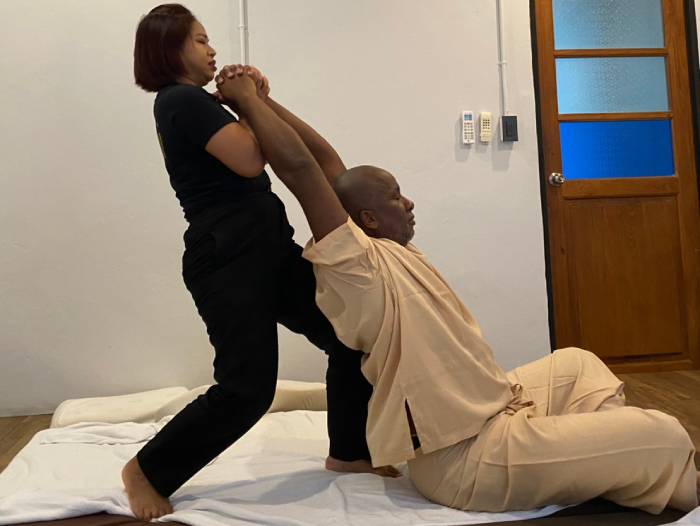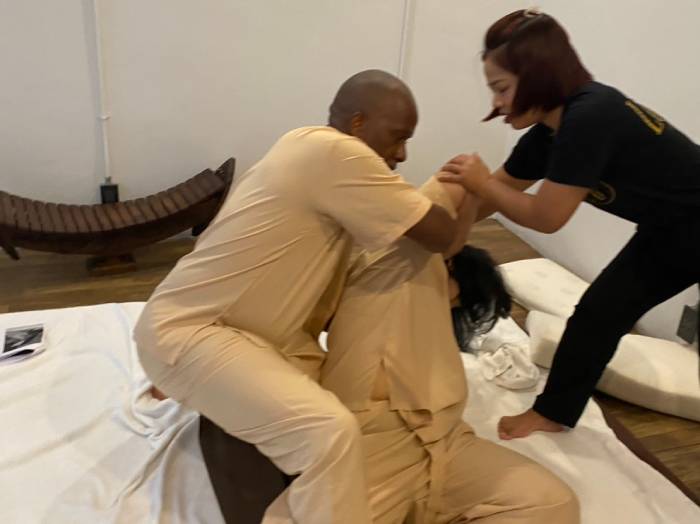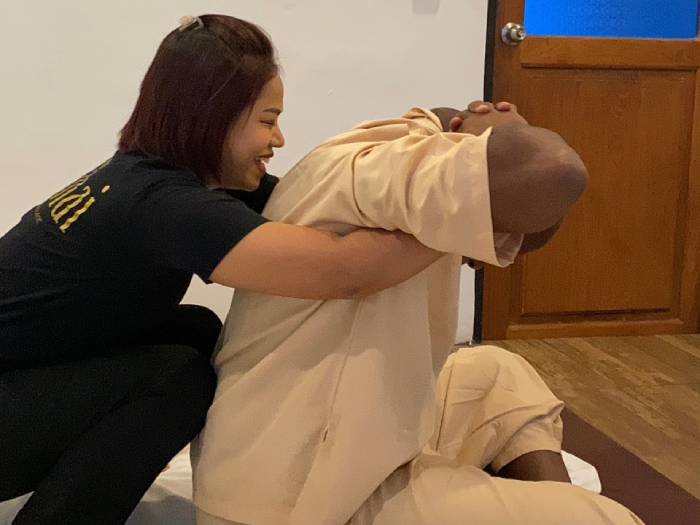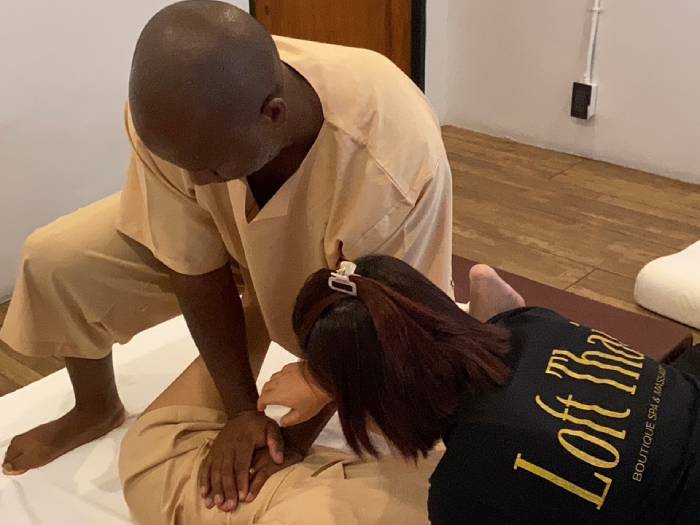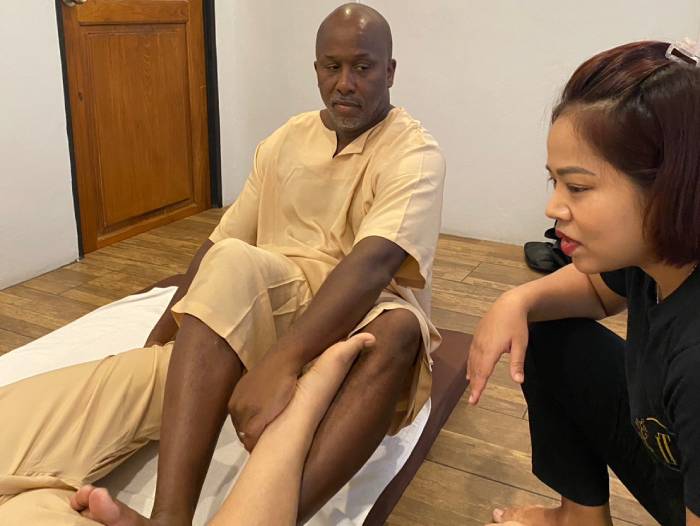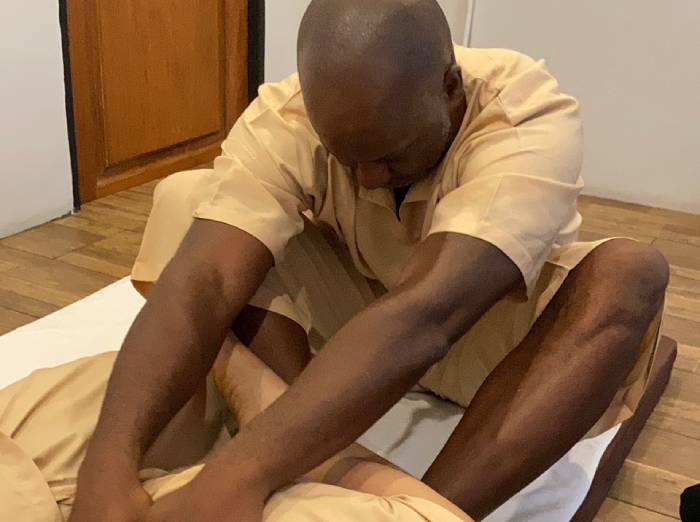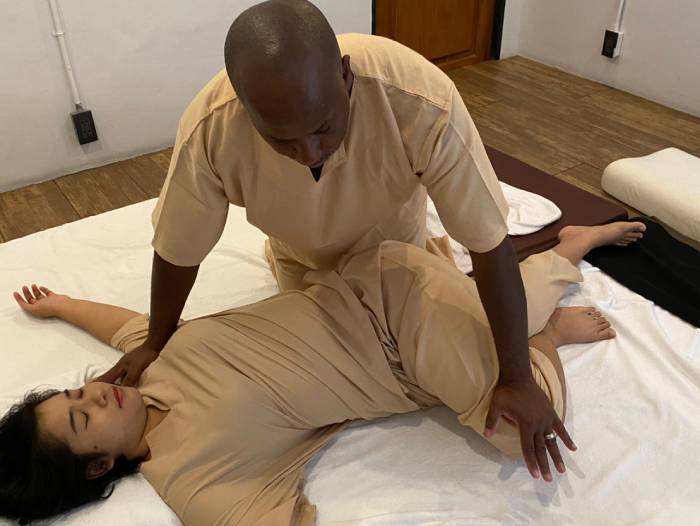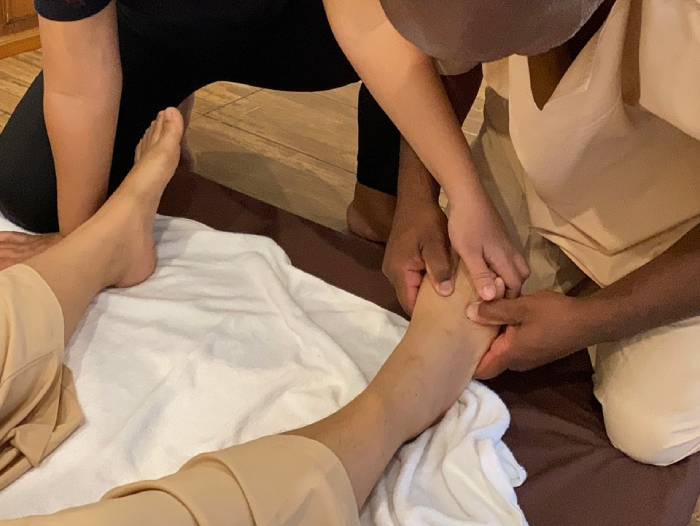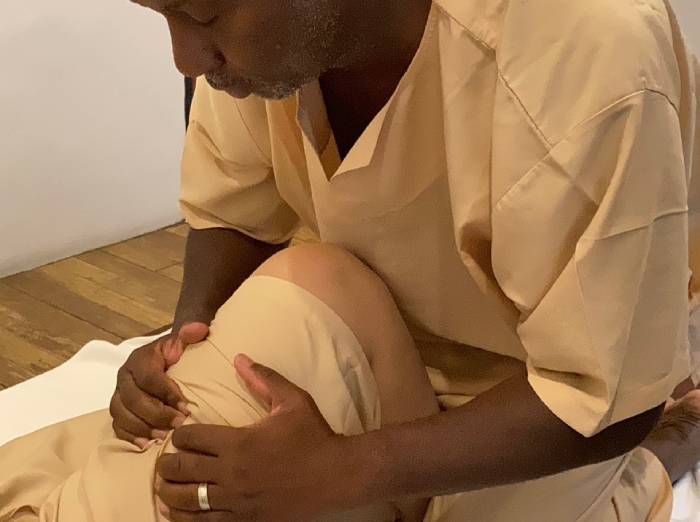150-Hour Certified Training in Bangkok
The art of Thai massage is more than a wellness technique—it is a profound and ancient healing system that reflects the soul of Thai culture. For those ready to pursue Thai massage professionally, our 150-hour certified Professional Thai Massage Course offers a deep and structured journey into both the physical and philosophical aspects of this sacred practice. Designed for serious learners who want to master Thai massage at a professional level, this course combines rigorous hands-on training with detailed theoretical instruction to prepare you for a successful career in the global wellness industry.
Rooted in centuries of tradition and adapted to meet modern professional standards, our course is recognized by the Union of Thai Traditional Medicine Society (UTTS), ensuring not only authenticity but also industry credibility. Over the course of 150 hours, students will gain in-depth knowledge of anatomy, body mechanics, Sen energy lines, advanced techniques, client care, and professional ethics. This training is suitable for those with some previous exposure to massage or bodywork, but dedicated beginners are also welcome.
Why Study in Bangkok – The Wellness Capital of Asia
Bangkok is not only Thailand’s bustling capital but also a global hub for traditional healing and wellness. A magnet for health seekers, spiritual travelers, and professionals in the field, Bangkok stands at the crossroads of ancient Eastern therapies and cutting-edge modern treatments. From therapeutic massage clinics tucked behind gilded temples to luxury spa sanctuaries in five-star hotels, the city presents a full spectrum of experiences that reinforce the relevance of traditional Thai massage in today’s world. Many wellness centers in Bangkok also offer complementary treatments such as Aroma Oil Massage and Hot Stone therapy, making it a perfect environment to immerse yourself in holistic healing practices.
Historical Roots of Thai Massage
Thai massage, or Nuad Thai, is believed to have been founded more than 2,500 years ago by Jivaka Kumar Bhaccha, a legendary physician who was a contemporary of the Buddha. Over time, the practice evolved through the influence of Indian Ayurvedic medicine, traditional Chinese medicine, and indigenous Thai healing traditions. Initially preserved and passed down in temples, especially in Buddhist monasteries, Thai massage was regarded not just as a therapeutic method but as a spiritual act—one involving compassion, mindfulness, and a meditative awareness of the body.
Course Preparation and Environment
Preparation begins before the first class. Upon enrollment, students receive a welcome package including their study materials, schedule, and recommendations for accommodations near the school. We encourage students to arrive with an open mind, ready to learn, and with a sincere respect for Thai culture and its healing traditions.
Training attire should be comfortable and suitable for movement, similar to what you would wear for yoga. Thai massage is practiced on floor mats rather than massage tables, and therapists must often kneel, squat, and lean with precision and balance, so flexibility and comfort are essential. Students are provided with all the necessary materials, including massage mats, pillows, oils (where needed), textbooks, models for demonstration, and sterilized practice tools.
Course Structure: Theory and Practice – 150 Hours with Certification
The Professional Thai Massage Course is divided into two major components: theory and practice, totaling 150 hours. The training meets the highest standards of the Union of Thai Traditional Medicine Society (UTTS), the official body in Thailand regulating traditional Thai healing arts. Students who complete this training will receive a professional certificate recognized by UTTS, a valuable credential for those seeking to work in Thailand or internationally.
The curriculum is typically spread over several weeks and includes a final practical and theoretical exam. The schedule may vary slightly based on the intensity (full-time or part-time) but is structured to allow each student to fully absorb, understand, and master the content.
Theory (Approximately 30–40% of the course)
The theoretical component introduces students to essential knowledge that supports safe and effective Thai massage practice. Subjects include:
- The history and development of Thai massage
- Buddhist philosophy and the spiritual foundation of healing
- Anatomy and physiology relevant to Thai massage
- Energy pathways or “Sen Sib” lines and their functions
- Contraindications and safety precautions
- Client consultation, ethics, and professional standards
- Case studies and protocol development
Lessons are delivered through lectures, visual aids, group discussions, and interactive Q&A sessions. This component is essential not only for exam preparation but also for building a responsible, knowledgeable approach to client care.
Practice (Approximately 60–70% of the course)
The practical segment of the course is highly immersive and progressive. Students begin with fundamental postures and techniques, then gradually move to more advanced sequences. Each position—supine, side-lying, prone, and seated—is explored in depth, with a focus on posture, pressure, breathing, and flow.
Students practice on one another under the close supervision of the instructor, allowing for real-time feedback and correction. Emphasis is placed on developing a natural rhythm, refining touch, and creating a therapeutic atmosphere. Every step of the full-body massage sequence is broken down and demonstrated, with students repeating and refining the techniques through repetition and variation.
Key Stages of Practical Training
The training unfolds in stages, beginning with body mechanics and therapist positioning. Students are taught how to work efficiently with body weight rather than muscular strength. This protects the practitioner from injury and makes the massage experience more fluid and effortless.
As students progress, they will learn complementary techniques such as Herbal Compress therapy, Body Scrub & Wrap treatments, and Aroma Oil Massage to enhance their skill set and provide clients with a well-rounded therapeutic experience. These additional techniques help improve circulation, detoxification, and relaxation, making them valuable additions to any massage professional’s repertoire.
In the later part of the course, students learn how to perform a complete 90- to 120-minute Thai massage session. This final step combines everything learned into a fluid, confident, and customized treatment that reflects the therapist’s style, intuition, and professionalism.
Assessment and UTTS Certification
To receive the official UTTS certificate, students must successfully complete both a practical exam and a written or oral theoretical exam. The practical exam involves demonstrating a full-body Thai massage sequence under the observation of certified instructors. Students are evaluated on their posture, technique, sensitivity, professionalism, and ability to adapt their approach to the needs of a client.
The UTTS certificate is highly regarded in Thailand and recognized by many international bodies. It represents not only the completion of training but also a commitment to upholding the values of Thai traditional medicine. Graduates can use this certificate to apply for massage licenses, gain employment in spas, wellness centers, and resorts, or pursue further study in specialized areas.
Recommendations and Personal Growth
The path to becoming a professional Thai massage therapist requires dedication, presence, and humility. We recommend that students maintain a personal self-care routine during the course—this includes stretching, hydration, good sleep, and mindful breathing practices. The training is both physical and introspective, and students who approach it with sincerity often report not only professional growth but also personal transformation.
We also suggest spending time outside the classroom exploring Thai culture, temples, cuisine, and the way of life. This cultural immersion enhances your understanding of the values that form the foundation of Thai healing—compassion, stillness, and interconnectedness.
Benefits of the Course
The benefits of completing our Professional Thai Massage Course are multifaceted. On a technical level, you will gain a mastery of full-body Thai massage, an understanding of therapeutic applications, and the confidence to work professionally with a wide range of clients. On a personal level, you will cultivate presence, discipline, and a deeper connection with your own body and others.
Career-wise, the UTTS certification opens doors. Our graduates have gone on to work in top-tier spas in Thailand, Europe, the Middle East, and beyond. Others have opened their own studios, joined retreat centers, or become instructors themselves. Thai massage is also a valuable skill for yoga teachers, physiotherapists, bodyworkers, and holistic health coaches looking to expand their treatment offerings.
Additionally, Thai massage is increasingly recognized as a complementary therapy for chronic pain, stress, insomnia, and mobility issues, making it a powerful tool in both preventive and therapeutic wellness strategies.
Understanding UTTS – The Union of Thai Traditional Medicine Society
An essential aspect of our Professional Thai Massage Course is that it is officially certified by the Union of Thai Traditional Medicine Society (UTTS). This institution plays a pivotal role in preserving, promoting, and regulating the practice of Thai traditional medicine and massage within Thailand.
About UTTS
The UTTS is a prestigious national organization officially recognized by the Ministry of Public Health in Thailand. It was established to uphold the standards of Thai traditional healing practices and to ensure that practitioners across the country are properly educated, trained, and licensed.
As the primary regulatory and advocacy body for Thai traditional medicine, the UTTS collaborates closely with educational institutions, health authorities, and international partners to promote the safe and professional application of these time-honored practices.
UTTS Responsibilities
- Approving and certifying Thai massage schools that meet educational and professional standards
- Developing standardized curricula for Thai massage and related fields
- Certifying individual practitioners who have met the required level of competency
- Promoting Thai traditional medicine both nationally and internationally
- Supporting academic research in Thai traditional healing
- Safeguarding Thai cultural heritage related to traditional medicine and massage
UTTS Certification Benefits
When you complete a certified course with UTTS accreditation, it signifies that your training adheres to nationally approved standards of education, professionalism, and safety. This certificate is recognized throughout Thailand and internationally, giving you a significant advantage when applying for massage licenses or seeking employment in wellness centers, spas, or clinics around the world.
Holding a UTTS-certified diploma also allows Thai nationals and some residents to pursue the path of becoming a licensed Thai Traditional Medicine Practitioner under the Thai Ministry of Public Health.
Conclusion
The Professional Thai Massage Course is not merely an educational program—it is a rite of passage into the world of traditional healing. Rooted in centuries of wisdom, refined through hands-on practice, and recognized by the UTTS, this training equips you with the knowledge, skill, and credibility to practice Thai massage professionally around the world.
Set in the heart of Bangkok’s Sukhumvit district, this course offers a learning environment that is both grounded in tradition and enriched by modern convenience.
Note: This course description provides a comprehensive overview. Exact training content, hours, scheduling, and examination format may vary slightly based on curriculum updates and student group needs.
If you would like to experience the Thai Massage performed by a professional therapist, we highly recommend booking a session with our partner Loft Thai Boutique Spa & Massage. Their experienced team offers authentic treatments in a serene and luxurious setting. To explore and book your session, please visit the link below. All students from Nuad Thai School are entitled to an exclusive 20% discount on all treatments.
Pricing
Packages made for anyone!
Thai Discover
- 4-hours group course
- Instructor & Model
- Introduction & Theory
- Thai Massage Practice
- School Certification
Thai Beginner
- 4-hours private course
- Instructor & Model
- Introduction & Theory
- Thai Massage Practice
- School Certification
Thai Professional
- 150 hours private course
- Instructor & Model
- Professional Training Course
- Custom or Tailor-Made
- Official THAI UTTS Certification

